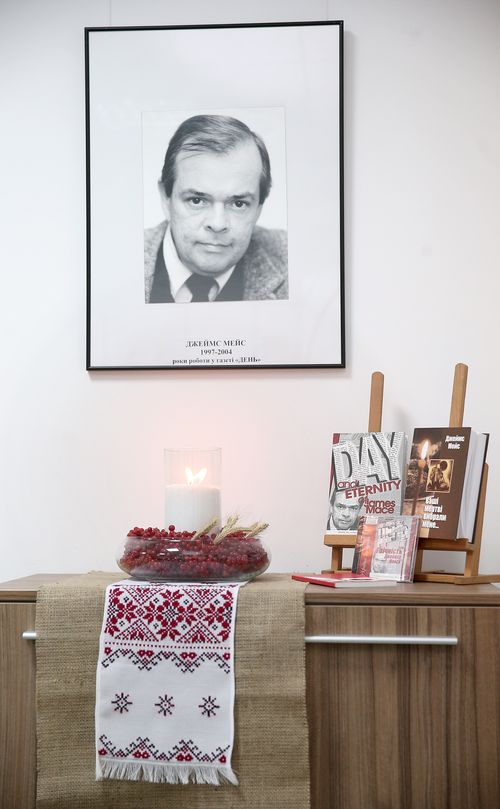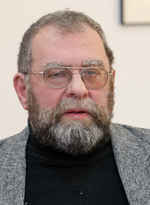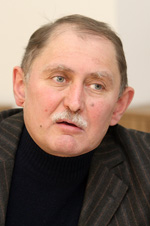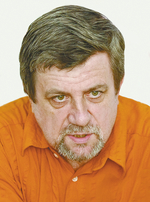It will only be fair to call him one of the first to pave the way for an independent Ukrainian state. James Ernest Mace, a historian, political writer, thinker, public activist, the son of America and a great Ukrainian, would have been 65 on February 18. This marvelous personality, a man of Truth, a scholar, who exposed – perhaps more convincingly and profoundly than any other contemporaries – Stalin’s totalitarian machine of homicide, departed this world in May 2004. He could have undoubtedly been the intellectual motor of both the Orange Revolution and the Revolution of Dignity. Seeing what a tragic turn the events in Ukraine are taking, what heroism and self-sacrifice the nation is displaying, and, at the same time, what a real danger is to Ukrainian statehood, Mace would have hardly struck an “ambitious” pose – “I foresaw all this, I warned about it” – because he did not belong to “hurt oracles.” He called things by their proper names, he spoke the truth.
His true humanism, love for Ukraine, courage in search of the truth, the highest professionalism of a historian, and the incredible intuition of a seer helped him deservedly win worldwide fame. It is not only about his fundamental research of the 1932-33 genocidal Holodomor, but also about his political, historical, and philosophical publications on the past and present of “post-genocidal” Ukraine. Mace was the first to peek into the abyss of evil, he saw biblical-scale tragedies in 20th-century Ukrainian history (for only in the Eternal Book can you find analogies to such terrible inhuman evils and tortures, as well as punishment for evil) and told the world about this. Maybe, even the past three “fiery” years of our history are not enough for Ukrainians to fully heed him. We still have to go a long way to gain as deep an insight as Mace had. And those who are saying “regretfully”: “who could have ever thought that Russia would attack us?” Are playing the hypocrite. Mace warned about this threat 20 years ago and later in Den/The Day’s publications. You did not hear him, but who is to blame?

Photo by Ruslan KANIUKA, The Day
Our newspaper requested some winners of the James Mace Prize for Public Activism – well-known historians and political journalists – to share their views on the topicality of his ideas.
OVERCOMING UKRAINE’S POSTCOLONIAL SYNDROMES
Serhii HRABOVSKYI, political writer, winner of the 2011 James Mace Prize:
 “Oddly enough, a large number of historians, philosophers, and political scientists are denying today, in 2017, with stubbornness worthy of a better application, that Ukraine was a colony in the Soviet empire, although they do not deny the very fact of this empire’s existence. They allege that Ukrainians fared quite well even under ‘colonial oppression’ (they demonstratively write this word combination between quotation marks). Moreover, it turns out that ‘the Ukrainian Republic played perhaps the main role’ in the formation of the USSR and Ukraine as such was an accomplice in the Holodomor, the Great Terror, and other horrible crimes of Bolshevism. For, we are told, Ukrainians, some of whom even reached high offices and gained international recognition, took part in all those misdeeds.
“Oddly enough, a large number of historians, philosophers, and political scientists are denying today, in 2017, with stubbornness worthy of a better application, that Ukraine was a colony in the Soviet empire, although they do not deny the very fact of this empire’s existence. They allege that Ukrainians fared quite well even under ‘colonial oppression’ (they demonstratively write this word combination between quotation marks). Moreover, it turns out that ‘the Ukrainian Republic played perhaps the main role’ in the formation of the USSR and Ukraine as such was an accomplice in the Holodomor, the Great Terror, and other horrible crimes of Bolshevism. For, we are told, Ukrainians, some of whom even reached high offices and gained international recognition, took part in all those misdeeds.
“It is an interesting logic under which you can label Jews as accomplices in the Holocaust (for there were Judenraete) and American Indians as co-organizers of America’s conquest by conquistadors (for some tribes sided with the Spanish and Portuguese), and black slaves as responsible for their slavery (for they endured it!), etc., and call the Ukrainians who failed to ‘fare well’ in the Soviet era stupid or crazy. For example, a Perestroika-time journalism guru dared call Ivan Dziuba of the 1960s a ‘clueless guy.’
“By contrast with these intellectual crossbreeds who call themselves Ukrainians, James Mace always emphasized that it is impossible to understand many difficulties in the development of the Ukrainian state and nation unless you take into account their post-colonial, post-genocidal, and post-totalitarian nature. What is more, totalitarianism was brought to Ukraine from abroad and reinforced by the locals who collaborated with the ‘red empire,’ while genocide was an instrument to subdue the Ukrainian nation and destroy the potential of its independent development. I will let myself quote at length one of Mace’s publications on this topic: ‘Another difficulty is orientation of Western historians to the ‘Russian pattern’ as a dominant one in the history of the so-called ‘borderlands,’ i.e. non-Russian national republics. In my view, it is a wrong interpretation of the 20th-century idea that in Europe there are ‘historical’ nations and, by Friedrich Engels’s definition, ‘ruined fragments of nations,’ non-historical peoples whose destiny is decided by stronger neighbors and which are doomed to assimilation. Nobody will say so today about non-European, formerly colonial, peoples of Asia and Africa for fear of being accused of racism and Europe-centrism. But (which has always seemed to me an extremely bizarre phenomenon) the pattern of thinking, which is absolutely unacceptable for other nations, was accepted as a dogma when it was about the peoples of the former USSR, including and above all Ukraine. In the recent past, this view was caused by political expediency. Today, it is the result of political provinciality which particularly runs through the announcement of a study by Michigan University Professor Ronald Suny. This well-known ‘national question specialist’ has decided to rewrite Richard Pipes’ monograph on the formation of the Soviet Union to prove that class struggle has always been much more important and decisive in the history of all the ‘borderlands’ than the struggle for national liberation. It is appropriate to ask Ronald Suny: why did the Red Army of Russia have to resort to a wide-scale intervention if all the working people – Ukrainians, Armenians, the Caucasian peoples, Muslims, etc. – were so eager to ‘reunite’ with the big brother – the Great Russian proletariat?’
“As we can see, the Ukrainian deniers of Ukraine’s colonial status in the USSR are ‘double provincials’ who follow the quasi-scientific concepts of Western and Russian ‘national question specialists.’
“And the question is not about ‘pure theory’ or somebody’s intellectual exercises but about the way of self-liberation for a recent ‘colonially subordinate country,’ as Mace characterized Ukraine. There is nothing shameful in this characterization, for it describes the real state of affairs and, at the same time, legitimizes the powerful anti-colonial and anti-totalitarian movement that never stopped in Soviet Ukraine and thwarts the attempts of certain Western circles to equate Ukrainian revolutionary liberation nationalism with imperial chauvinistic nationalism in Russia. In the past few decades, postcolonial studies have become a strong and multidimensional theoretic field which also comprises James Mace’s research and ideas, but is the ruling elite taking his research into account or listening to ‘utter provincials’ who are in fact hindering the present-day Ukraine’s postcolonial syndromes from being understood and overcome?”
JAMES MACE’S PAIN
Volodymyr BOIKO, historian, winner of the 2013 James Mace Prize:
 “Imagine an individual who lives next to you but, for some reason, can see farther and better than you. Almost nobody understands this. So an uncommon behavior is considered as just quaintness of a good person. The odd man does not even try to challenge this opinion about him, for it’s not interesting for him to waste his time on this. He adheres to established values and ideas that determine the assessment of people and events. He is a good historian with a classic education gained at one of the world’s best universities. He also excels in economics and can, accordingly, work at the intersection of different sciences. Interdisciplinary research is one the foundations for creating original works. They allow applying what may seem as wrong instruments for exploring the well-known phenomena that often lead to unexpected and paradoxical conclusions.
“Imagine an individual who lives next to you but, for some reason, can see farther and better than you. Almost nobody understands this. So an uncommon behavior is considered as just quaintness of a good person. The odd man does not even try to challenge this opinion about him, for it’s not interesting for him to waste his time on this. He adheres to established values and ideas that determine the assessment of people and events. He is a good historian with a classic education gained at one of the world’s best universities. He also excels in economics and can, accordingly, work at the intersection of different sciences. Interdisciplinary research is one the foundations for creating original works. They allow applying what may seem as wrong instruments for exploring the well-known phenomena that often lead to unexpected and paradoxical conclusions.
“As a result, this causes the effect of prophecy if, of course, the researcher has taken into account all the key factors, missed nothing, and made no errors in calculations. To err is human, so, to minimize this danger, developed countries prefer to simultaneously maintain several parallel research centers, which makes it possible to compare things and make rational administrative decisions. But this is a sphere of politics with its own algorithm. We are interested in different thing – an effective management system gives odd people a chance to show their worth, although it far from always agrees with them.
“Acceptance or non-acceptance is a very dangerous moment. For a negative result raises the question of what to do next. In other words, the question is either to adjust or perhaps to change the subject and the field of activity or to go on standing your ground, thus choosing the difficult and ungrateful way of a loner with a slim chance to change matters in the indefinitely distant, rather than near, future.
“And it is in this case a matter of not the system or the milieu but of personal character and conscience. There are always a certain number of contemporaries with an extremely sensitive perception of the world. It does not matter what country people are living in, for national particularities hardly play a decisive role here. Simply, this kind of people can generalize and express what others see but, for some reason, are not saying this – they either cannot or do not want to do so, or do not understand things. They keep their inherent childish ingenuousness for years in spite of the experience they gain and the disagreements they have to resolve.
“James Mace combined these features in his personality. He made his first journeys to Ukraine in search of ample grounds for the conclusions he had reached while researching the 1932-33 Holodomor in Ukraine. The vast majority of US Kremlinologists did not accept these conclusions, but he knew that it was the stunning truth. What Mace saw in Ukraine really terrified him – he encountered (by his own definition) a post-genocidal society that was afraid to confess to itself on what had happened. It was futile to hope for rapid changes – it is impossible to cut off the stereotypes that dominate in human minds in a jiffy, as if it were artificial lighting. Even after the collapse of the system that brought them about, they continue to hold sway over reason and lay the groundwork for actions.
“On several photographs, Mace looks as if he is suffering pain. It is no accident – he looked like this quite often, although not always, of course, in company. He also smiled, especially beside his wife, Natalia Dziubenko. I may be wrong, but it is clearer now why his face expressed pain – he seemed to be aware of what would happen later. And it is always psychologically hard to know the future of you, your family, relatives, and country and not to be able to change anything. In other words, you are in for cataclysms which can be modeled quite precisely, but you personally can do nothing. For even the people close to you, let alone those who wield power, do not view your appeals as a warning of a real danger – due to its incredibility, at first glance. But you have to pay for everything – for escaping reality or, likewise, for wanting to find easy answers to difficult questions. In the early 2000s Mace sharply criticized his own government for the Iraq war, for he thought that this war could radically change the world and the unwritten rules of behavior in it because values were disrespected. After all, we can see now the long-term consequences of the decisions that seemed tactically right to many.
“Mace did not rule out similar actions against Ukraine. It was clear to him, but not to most of us at the time, where they could come from. But it was necessary to live on, trying to accomplish the voluntarily assumed mission.”
BLACK HARVEST AND CANDLE OF HOPE
Ihor SIUNDIUKOV, editor, “History and I” section, newspaper Den; winner of the 2010 James Mace Prize:
 “One must, above all, read James Mace – very attentively, straining one’s mind (and heart), with a pencil in hand. Unfortunately, we are still to learn his heritage, even though the 13 years that have passed since James departed this life have endlessly proved the precision of his forecasts, the depth of his analysis of our problems, and the fearless truth of his conclusions. This is why the following well-known words of Lesia Ukrainka can be referred to James’ works: ‘We would like to be less praised in public but more read.’ Naturally, this does not mean that streets named after him, monuments to him, mass-scale publication of his works, and awards are not needed – all this is a must!
“One must, above all, read James Mace – very attentively, straining one’s mind (and heart), with a pencil in hand. Unfortunately, we are still to learn his heritage, even though the 13 years that have passed since James departed this life have endlessly proved the precision of his forecasts, the depth of his analysis of our problems, and the fearless truth of his conclusions. This is why the following well-known words of Lesia Ukrainka can be referred to James’ works: ‘We would like to be less praised in public but more read.’ Naturally, this does not mean that streets named after him, monuments to him, mass-scale publication of his works, and awards are not needed – all this is a must!
“Yet it is absolutely necessary that, if we want to successfully defend our honor and statehood, we must read very attentively the warnings Mace addressed to the people of Ukraine. The point is that the aggressive imperial Russia poses the main threat to the very existence of a free Ukraine. ‘Frankly speaking, today’s Russia, regardless of the stand taken by its political forces, regards the very existence of Ukraine as a deadly insult. Russia’s political culture and historical memory will never accept Ukraine other than an inalienable part of Russia’s heritage. Russia for Ukraine is the realm of the Ems Ukaz; tsarist and Soviet Russia’s political culture has required constant monitoring of Ukraine, watching for separatism, Mazepism, Petliurism, Banderism, and national identity other than Russia’s. One doesn’t have to be prophet to tell what will happen when Russia is given a free rein in Ukraine,’ James wrote as far back as 1996 (!).
“James used to warn until the last days of his life that the criminal oligarchic (in fact semi-feudal) socioeconomic system in post-genocidal Ukraine is not and, ‘by definition, cannot be able to protect the country from numerous foreign and domestic threats or respond to the challenges of time. Undoubtedly, the fact that the oligarchy (even though repainted in ‘patriotic’ colors) is still wielding a great deal of clout even after terrible sacrifices, after the Maidan of Dignity and the war in the east, would have embittered and enraged Mace. For the great Ukrainian knew very well that our people are incredibly patient, but any patience will come to an end, and then…
“Watching our politicians from various camps, James noted with pain: ‘So many words! How skillfully they are sweet-talking Ukraine!’ This is also a warning to us, for what rings loudly is usually empty inside. Therefore, we should judge people on top of the governmental ‘pyramid’ not by their oratory skill but by their concrete, real deeds, as well as by the facts of their previous life story, particularly when the latter is too ‘foggy,’ ‘blurred,’ and too contradictory.
“The bitterness of horrible tragedies sets off the grandeur and joy of the Ukrainians’ unquestionable forthcoming victories. James Mace knew and believed in this. This is why there is not only the Black Harvest of 1933 and the Candle of Sorrow, but also the Candle of Hope in his books. These books’ strength lies in this.”
“DOWN THE ROAD OF TEARS…”
Serhii TRYMBACH, winner of the 2016 James Mace Prize:
 “James Mace said he had hit upon the idea of researching genocide by force of spontaneous and somewhat accidental circumstances. In particular, he was struck by how the American Indian neighbors had gone down their own ‘road of tears.’
“James Mace said he had hit upon the idea of researching genocide by force of spontaneous and somewhat accidental circumstances. In particular, he was struck by how the American Indian neighbors had gone down their own ‘road of tears.’
“Great personalities are formed under the irresistible influence of a tragic experience of individuals and peoples. All you have to do is open your heart to that experience and turn your own shock into a long-term scenario of seeking a goal in life. This is what creates a personality and lets him or her put aside personal dimensions and change the ‘map of routine,’ the very setup of everyday life. It is as simple as that, but very few people manage to do so. James Mace managed to do this, for he is one of those who really changed Ukraine. At least, he gave this country an impetus, and it would be a crime to ignore it and have to go down our own ‘road of tears.’
“Whether or not we will manage to do this depends on us only. Mace did his best to charge us with energy for a long-lasting journey to ourselves.”
MEANINGFUL TEXTS VERSUS THE “CONFEDERACY OF DUNCES”
Petro KRALIUK, Doctor of Sciences (Philosophy), professor, winner of the 2013 James Mace Prize:
 “Unfortunately, James Mace still remains topical. Why unfortunately? Because neither our ruling elite nor the greater part of society accepts and comprehends his valuable ideas. If they comprehended, we would obviously have a different Ukraine and have no occupied territories and war.
“Unfortunately, James Mace still remains topical. Why unfortunately? Because neither our ruling elite nor the greater part of society accepts and comprehends his valuable ideas. If they comprehended, we would obviously have a different Ukraine and have no occupied territories and war.
“Let me cite some thoughts of this thinker.
“‘A healthy national identity does not mean discrimination or xenophobia, it is only pride for your language, culture, history, the unique contribution of your nation to the common heritage of a diversified human civilization.’ Now let us see how the Ukrainian language, culture, and history are being respected in this country. By all accounts, the Ukrainian language was and still is being despised in Ukraine – in the mass media, business, and other spheres. The same applies to Ukrainian culture which is in a clandestine or semi-clandestine condition in Ukraine. And the history of Ukraine? For most Ukrainians, it is not a material for reflecting on our past and our position in today’s world but a set of very often primitive myths that shape the complex of provincialism.
“One more of Mace’s quotations: ‘Nobody else but Ukrainians should build a Ukraine worthy of a place in Europe.’ Now let see what has been going on here after the Revolution of Dignity. It was decided on the top, for some reason, that Ukrainians need ‘foreign volunteers’ to build the Ukrainian state. This volunteerism still continues. But has it produced any positive results? Frankly speaking, I can see none. But there seem to be too many problems with these volunteers. Sometimes I ask myself: are we really so muddleheaded that we can’t find Ukrainians who will effectively perform managerial functions? But our tops don’t seem to be too busy looking for such people. They prefer to get foreign money, invite a foreign volunteer, and create a semblance of reforms.
“And, quite in the vein of this topic, one more sarcastic quotation of Mace: ‘According to the English writer Jonathan Swift, when a great genius appears in the world, the dunces are all in confederacy against him. So it would be more polite to call the current Ukrainian politics as Swift’s confederacy of dunces.’ Harsh but fair words indeed… For, really, we have what we have.
“I wouldn’t like our politics to remain a confederacy of dunces that stifles talents. But, to ward it off, one should at least read meaningful texts, including ones by James Mace.”







